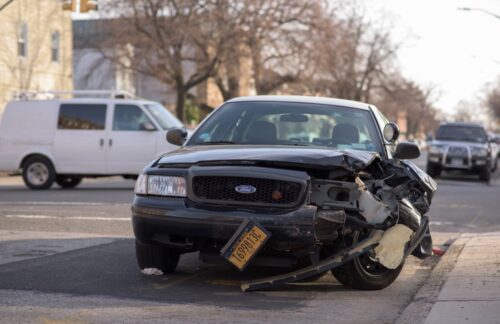You may believe you’re an excellent driver. But accumulating a number of traffic violations or a DUI conviction causes insurance companies to designate you a high-risk driver. If this happens, you’ll need high-risk auto insurance, which causes your insurance rate to skyrocket in certain cases. If the state convicts you of DUI, you’ll certainly need high-risk insurance with an SR-22 certificate filing (or an FR-44 filing in Florida and Virginia).
There are a number of high-risk insurance classifications drivers may fall into. These driving behaviors include a record of excessive traffic tickets (points), accidents, DUI/DWI offenses, and insurance lapses. The increased risk associated with these behaviors leads to higher insurance rates than safe drivers get. Auto insurance companies calculate premiums based on the potential risk a driver poses to them. Generally speaking, the more likely you are to file an insurance claim, the more expensive your insurance will be.
You’ll want to shop around to find affordable car insurance policies for high-risk drivers. Finding a car insurance policy that meets your needs is essential, whether you have a good driving record or not. On that note, let’s take a detailed look into high-risk insurance to understand it better.
What Is High-Risk Insurance?
High-risk auto insurance coverage is for drivers who have a greater risk of submitting claims. Insurance premiums are higher for these drivers because of the additional risk they pose. An insurance provider will charge you extra for coverage if you have a higher chance of submitting a claim.
Classification Of High-Risk Drivers
Teenage Drivers
Research shows that teenage drivers who have recently earned their license pose a greater risk than most adult drivers. It is common for young drivers’ insurance costs to go down after age 25 if they maintain a clean driving record. Nevertheless, even younger drivers can cut insurance costs if they maintain good grades and minimize traffic offenses and accidents.
Insurance providers view beginner drivers, even those over age twenty-five, who are still learning to drive as a higher risk. Most people in this category reside in large cities where they have a variety of alternative transportation choices, thus do not require a car.
Drivers Age 65 Or Above
Although auto insurance premiums tend to decrease as you approach 25, they often increase after you reach the age of 65. This change in rates is mainly because senior citizens are more likely to be in catastrophic traffic accidents. The NHTSA’s National Center for Statistics and Analysis Older Population 2020 Data found that drivers 65 and older made up 17% of all traffic fatalities that year.
People With Lapses In Coverage
Suppose you haven’t maintained auto insurance for a certain time, for whatever reason. In that case, it may be a shock to learn that premiums have likely increased dramatically by the time you require it again. After a lapse of coverage, the only approach to lower your insurance rate is to have a few years of spotless driving under your belt.
Drivers With No Credit Or Bad Credit
Insurance costs are often lower for drivers with solid credit than those with poor or no credit. However, trying to save money by artificially improving your credit score will only decrease your insurance expenses while increasing interest charges on your credit card.

People With Traffic Violations
More than a quarter of all U.S. road deaths happen due to speeding. Therefore, a speeding ticket can have an enormous impact on insurance rates. Other violations, such as running a red light, carry the same penalties. Avoiding infractions like these demonstrate to insurance companies that you’re a responsible driver with minimal risk potential.
Drivers With DWI Or DUI Convictions
Reckless driving and DUI/DWI convictions significantly contribute to a rise in the cost of your auto insurance. As a result, getting an SR-22 certificate is very important.
People With A Variety Of Traffic Offenses
Some violations can ultimately put you in the high-risk category:
- Hit-and-run incidents
- Driving 20 mph or more over the speed limit
- Road rage altercations
How Long Do Insurance Companies Consider Someone A High-Risk Driver?
Insurance companies charge newly-licensed drivers and those with a coverage gap a higher premium for a minimum of six months. After six months of on-time payments, you may be eligible for a reduction in your insurance premiums.
Motor vehicle violations can remain on a high-risk driver‘s record for up to three years. A serious traffic offense like DUI/DWI can negatively affect one’s insurance rate for up to 5 years.

How To Select A High-Risk Insurance Company
High-risk drivers can’t get the same insurance plans and rates as those with standard/preferred policies. People with zero or few infractions, limited claims, a strong credit rating, and continuous insurance coverage get lower insurance rates.
If you continue driving safely, you can get standard/preferred policy again, which will result in a rate reduction. UltraCar Insurance will provide you with the best rates possible when you require them most.
Some insurance companies may be willing to give high-risk drivers the option of purchasing basic coverage at a higher price. Another choice is a “nonstandard policy,” limiting who can use the automobile and how much coverage you can buy. Around one-fifth of all private vehicle insurance sales are in the non-standard sector. Small specialty insurers and divisions of large insurance companies offer non-standard insurance to high-risk drivers.
Finding the right insurance options in this circumstance might be difficult with so many choices available. Fortunately, UltraCar Insurance can help you with that!

UltraCar Insurance is a leading online high-risk insurance provider offering FR-44 and SR-22 Insurance in Florida. We specialize in high-risk insurance and offer a variety of policy options. Whether you need an FR-44 Insurance provider Florida or non-owner SR-22 insurance in Florida, we do it all. Contact us to learn more about our high-risk insurance options.

